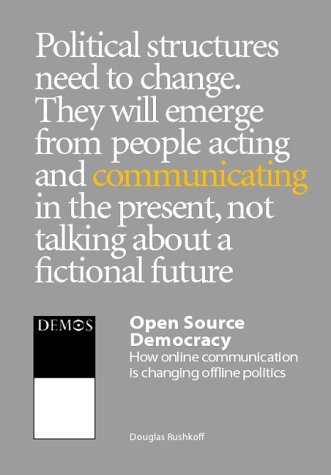
Open Source Democracy
2003
First Published
3.85
Average Rating
65
Number of Pages
An Excerpt from the book-Chapter 1 From Moses to modems: demystifying the storytelling and taking controlWe are living in a world of stories. We can't help but use narrativesto understand the events that occur around us. The unpredictability ofnature, emotions, social interactions and power relationships ledhuman beings from prehistoric times to develop narratives thatdescribed the patterns underlying the movements of these forces.Although we like to believe that primitive people actually believedthe myths they created about everything, from the weather to theafterlife, a growing camp of religious historians are concluding thatearly religions were understood much more metaphorically than weunderstand religion today. As Karen Armstrong explains in A History ofGod1, and countless other religious historians and philosophers fromMaimonides to Freud have begged us to understand, the ancients didn'tbelieve that the wind or rain were gods. They invented characterswhose personalities reflected the properties of these elements. Thecharacters and their stories served more as ways of remembering thatit would be cold for four months before spring returns than asgenuinely accepted explanations for nature's changes. The people wereactively, and quite self-consciously, anthropomorphizing the forces ofnature.
Avg Rating
3.85
Number of Ratings
27
5 STARS
37%
4 STARS
22%
3 STARS
33%
2 STARS
4%
1 STARS
4%
goodreads
Author

Douglas Rushkoff
Author · 23 books
Douglas Rushkoff is a New York-based writer, columnist and lecturer on technology, media and popular culture.